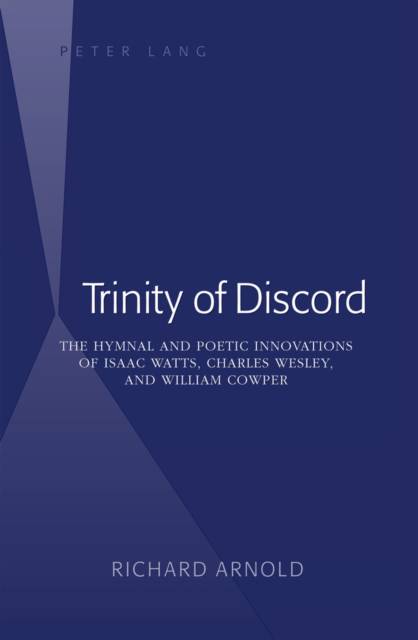
Bedankt voor het vertrouwen het afgelopen jaar! Om jou te bedanken bieden we GRATIS verzending (in België) aan op alles gedurende de hele maand januari.
- Afhalen na 1 uur in een winkel met voorraad
- Gratis thuislevering in België vanaf € 30
- Ruim aanbod met 7 miljoen producten
Bedankt voor het vertrouwen het afgelopen jaar! Om jou te bedanken bieden we GRATIS verzending (in België) aan op alles gedurende de hele maand januari.
- Afhalen na 1 uur in een winkel met voorraad
- Gratis thuislevering in België vanaf € 30
- Ruim aanbod met 7 miljoen producten
Zoeken
Trinity of Discord
The Hymnal and Poetic Innovations of Isaac Watts, Charles Wesley, and William Cowper
Richard Arnold
Hardcover | Engels
€ 111,45
+ 222 punten
Omschrijving
The three writers examined in Richard Arnold's Trinity of Discord, Isaac Watts, Charles Wesley, and William Cowper, are known as famous poets, but are also the greatest and most popularly compiled and used hymn-writers of all time. While masters of their kind, they were so remarkably different, considering they were working in the same (and quite new) genre. Moreover, when considered in their poetic-historical contexts, it is noteworthy that Watts can be seen as an archetypal Neoclassicist (not unlike Pope and Johnson), Wesley as a transitional pre-Romantic (not unlike Gray and Collins), and Cowper a thoroughgoing Romantic (not unlike Wordsworth and Coleridge, but with a much sharper psychological edge). Most noteworthy is that Watts, Wesley, and Cowper come before their later counterparts and their respective movements: their importance to mainstream or canonical literary history cannot be overestimated.
In terms of the hymn's development in the nineteenth and twentieth centuries, these three stand as beacons in the genre, if not individual species of a multiform genre itself. In their time and context, these three were, while paradoxically out of tune with the status quo, and radically different from each other, forging a new and everlasting genre, one born out of a veritable trinity of discord.
In terms of the hymn's development in the nineteenth and twentieth centuries, these three stand as beacons in the genre, if not individual species of a multiform genre itself. In their time and context, these three were, while paradoxically out of tune with the status quo, and radically different from each other, forging a new and everlasting genre, one born out of a veritable trinity of discord.
Specificaties
Betrokkenen
- Auteur(s):
- Uitgeverij:
Inhoud
- Aantal bladzijden:
- 162
- Taal:
- Engels
Eigenschappen
- Productcode (EAN):
- 9781433119040
- Verschijningsdatum:
- 3/08/2012
- Uitvoering:
- Hardcover
- Formaat:
- Ongenaaid / garenloos gebonden
- Afmetingen:
- 150 mm x 226 mm
- Gewicht:
- 385 g

Alleen bij Standaard Boekhandel
+ 222 punten op je klantenkaart van Standaard Boekhandel
Beoordelingen
We publiceren alleen reviews die voldoen aan de voorwaarden voor reviews. Bekijk onze voorwaarden voor reviews.









